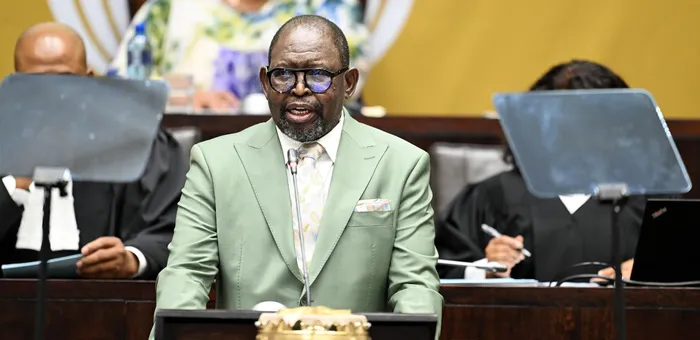
Finance Minister Enoch Godongwana announced the progress that has been made in identifying ghost workers during his 2025 Medium Term Budget Policy Statement (MTBS) on Wednesday.
Image: Parliament RSA/Supplied
There have been 8,854 high-risk cases flagged by the National Treasury, in partnership with the Department of Home Affairs and the South African Revenue Service, to identify and eliminate “ghost workers”.
Ghost workers are individuals who are listed on the payroll but do not perform the duties associated with their position – including individuals who have left the public service or who are deceased.
Finance Minister Enoch Godongwana announced the progress that has been made in identifying ghost workers during his 2025 Medium Term Budget Policy Statement (MTBS) on Wednesday.
In his MTBS, he said government has initiated an audit to not only identify ghost workers, but also identify payment irregularities across national and provincial departments.
“The National Treasury has partnered with the Department of Home Affairs and the South African Revenue Service to analyse payroll, population and tax data to identify potential ghost workers. Initial results indicate 8,854 high-risk cases requiring further verification."
“These include cases flagged for payment from multiple departments, inactive employees and those with bank account anomalies,” Godongwana said.
The minister added that a two-month verification process will begin in January 2026, followed by appropriate legal action.
The next phase of this project will use a single sign-on application being developed for public servants, as well as improvements to the government payroll system to automate monitoring to prevent irregularities and improve spending efficiency.
National Treasury Director-General, Dr Duncan Pieterse, said that it is difficult to state the monetary value saved while identifying ghost workers as “cases flagged still need to be verified” and that this will be done on an ongoing basis.
He also explained that this process is part of their Targeted and Responsible Savings (TARS) initiative, which systematically identifies duplication, eliminates waste, and reorganises programmes to deliver value for money.
Godongwana also highlighted that the Education Labour Relations Council is undertaking physical verification of teacher and learner numbers across all provinces to address concerns about the employment of ghost teachers.
“This audit will complement the government-wide ghost worker audit being coordinated by the National Treasury. Savings derived from this and other measures will be used by provinces to address funding pressures in the sector,” he said.
He explained that the Auditor-General of South Africa has been engaged to align methodologies used in the process, while coordination with the Department of Basic Education and the Education Labour Relations Council aims to support physical verification efforts and avoid duplication.
“Engagements are already underway with the Eastern Cape Provincial Treasury to implement ghost worker detection within the provincial health department. This multi-stakeholder approach aims to enhance the integrity, efficiency and accountability of public-service payroll systems.”
The minister also gave insight into the Early Retirement Programme, which was announced in the 2024 MTBPS.
Early retirement without penalties and with added financial incentives has been implemented since 15 October 2025. This initiative allows qualifying employees to exit the public service, where possible, replacing them with younger employees.
“Government set aside R5.5 billion during the 2025 MTEF period to enable 15,000 eligible employees to exit the public service between 2025/26 and 2026/27.
“Over the medium to long term this will achieve estimated average savings of R3.5 billion per year.
“In 2026/27, the National Treasury will launch a multi-year fiscal literacy campaign to build public understanding of and engagement with the opportunities and risks South Africa faces in managing spending, revenue and debt,” he said.
Related Topics: